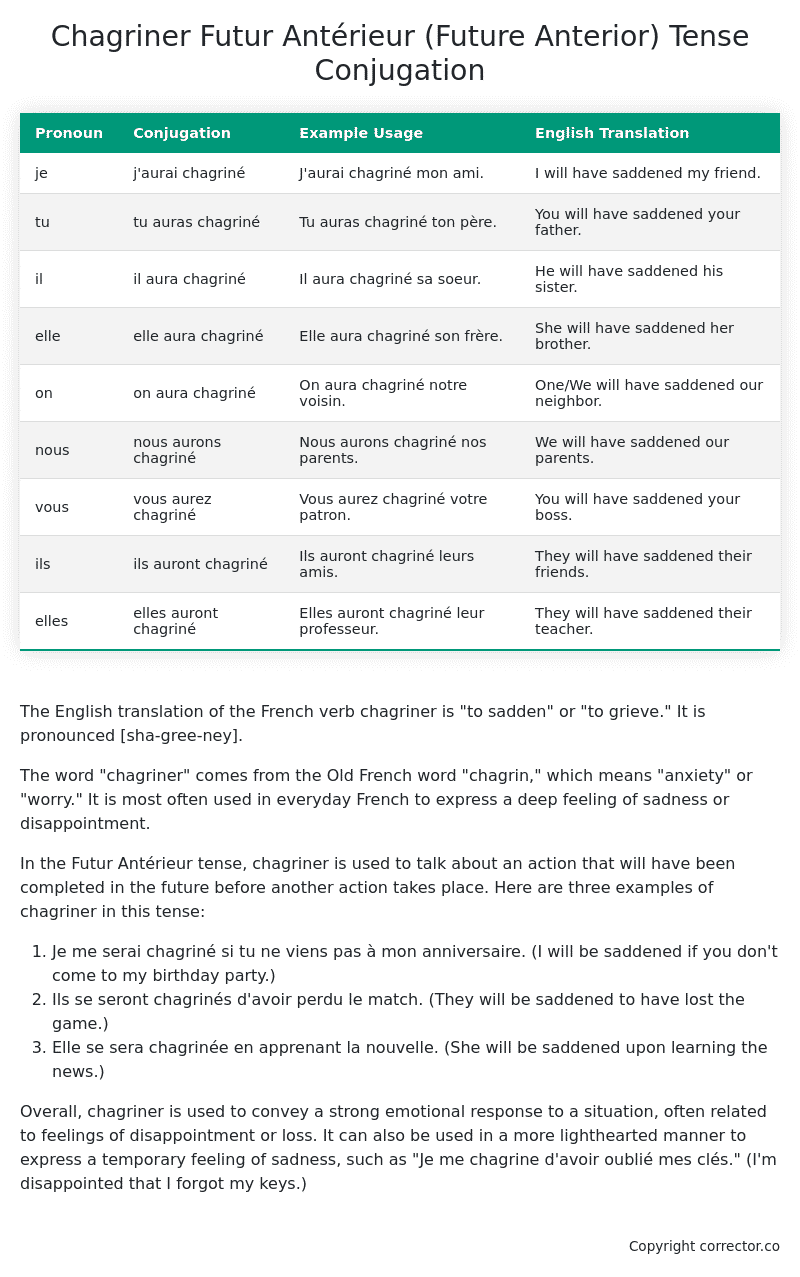Futur Antérieur (Future Anterior) Tense Conjugation of the French Verb chagriner
Introduction to the verb chagriner
The English translation of the French verb chagriner is “to sadden” or “to grieve.” It is pronounced [sha-gree-ney].
The word “chagriner” comes from the Old French word “chagrin,” which means “anxiety” or “worry.” It is most often used in everyday French to express a deep feeling of sadness or disappointment.
In the Futur Antérieur tense, chagriner is used to talk about an action that will have been completed in the future before another action takes place. Here are three examples of chagriner in this tense:
- Je me serai chagriné si tu ne viens pas à mon anniversaire. (I will be saddened if you don’t come to my birthday party.)
- Ils se seront chagrinés d’avoir perdu le match. (They will be saddened to have lost the game.)
- Elle se sera chagrinée en apprenant la nouvelle. (She will be saddened upon learning the news.)
Overall, chagriner is used to convey a strong emotional response to a situation, often related to feelings of disappointment or loss. It can also be used in a more lighthearted manner to express a temporary feeling of sadness, such as “Je me chagrine d’avoir oublié mes clés.” (I’m disappointed that I forgot my keys.)
Table of the Futur Antérieur (Future Anterior) Tense Conjugation of chagriner
| Pronoun | Conjugation | Example Usage | English Translation |
|---|---|---|---|
| je | j’aurai chagriné | J’aurai chagriné mon ami. | I will have saddened my friend. |
| tu | tu auras chagriné | Tu auras chagriné ton père. | You will have saddened your father. |
| il | il aura chagriné | Il aura chagriné sa soeur. | He will have saddened his sister. |
| elle | elle aura chagriné | Elle aura chagriné son frère. | She will have saddened her brother. |
| on | on aura chagriné | On aura chagriné notre voisin. | One/We will have saddened our neighbor. |
| nous | nous aurons chagriné | Nous aurons chagriné nos parents. | We will have saddened our parents. |
| vous | vous aurez chagriné | Vous aurez chagriné votre patron. | You will have saddened your boss. |
| ils | ils auront chagriné | Ils auront chagriné leurs amis. | They will have saddened their friends. |
| elles | elles auront chagriné | Elles auront chagriné leur professeur. | They will have saddened their teacher. |
Other Conjugations for Chagriner.
Le Present (Present Tense) Conjugation of the French Verb chagriner
Imparfait (Imperfect) Tense Conjugation of the French Verb chagriner
Passé Simple (Simple Past) Tense Conjugation of the French Verb chagriner
Passé Composé (Present Perfect) Tense Conjugation of the French Verb chagriner
Futur Simple (Simple Future) Tense Conjugation of the French Verb chagriner
Futur Proche (Near Future) Tense Conjugation of the French Verb chagriner
Plus-que-parfait (Pluperfect) Tense Conjugation of the French Verb chagriner
Passé Antérieur (Past Anterior) Tense Conjugation of the French Verb chagriner
Futur Antérieur (Future Anterior) Tense Conjugation of the French Verb chagriner (this article)
Subjonctif Présent (Subjunctive Present) Tense Conjugation of the French Verb chagriner
Subjonctif Passé (Subjunctive Past) Tense Conjugation of the French Verb chagriner
Subjonctif Imparfait (Subjunctive Imperfect) Tense Conjugation of the French Verb chagriner
Subjonctif Plus-que-parfait (Subjunctive Pluperfect) Tense Conjugation of the French Verb chagriner
Conditionnel Présent (Conditional Present) Tense Conjugation of the French Verb chagriner
Conditionnel Passé (Conditional Past) Tense Conjugation of the French Verb chagriner
L’impératif Présent (Imperative Present) Tense Conjugation of the French Verb chagriner
L’infinitif Présent (Infinitive Present) Tense Conjugation of the French Verb chagriner
Struggling with French verbs or the language in general? Why not use our free French Grammar Checker – no registration required!
Get a FREE Download Study Sheet of this Conjugation 🔥
Simply right click the image below, click “save image” and get your free reference for the chagriner Futur Antérieur tense conjugation!

Chagriner – About the French Futur Antérieur (Future Anterior) Tense
Construction
Common Everyday Usage Patterns
Interactions with Other Tenses
For example
Summary
I hope you enjoyed this article on the verb chagriner. Still in a learning mood? Check out another TOTALLY random French verb conjugation!


